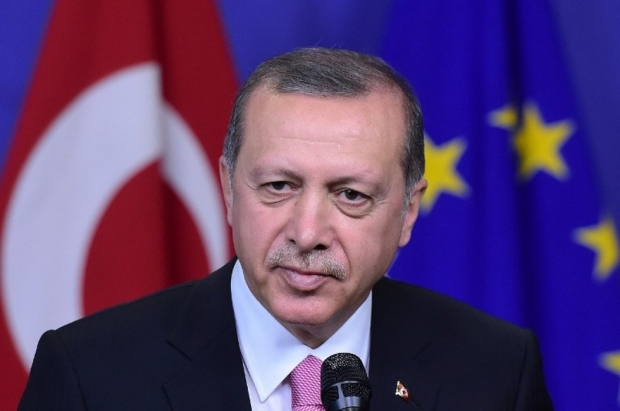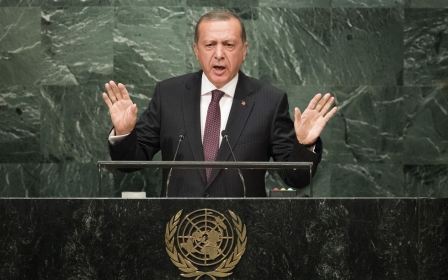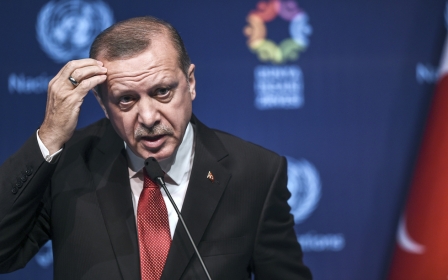Turkey and EU row: Erdogan threatens to back death penalty, open borders to migrants
Recep Tayyip Erdogan on Friday ratcheted up the tension with the EU, threatening to allow migrants to cross Turkey's borders and saying that he would sign a law bringing back the death penalty if it was approved by parliament.
"Democracy, it's respecting the people's will," said the Turkish president, speaking in Istanbul. "If the people say 'we want the death penalty'... and this goes to parliament and parliament passes it and it comes to me, I declare I will approve this."
He made his comments one day after the European Parliament voted to back a freeze in membership talks with Ankara, in response to cheering crowds' chants of "we want the death penalty" - an oft-repeated call during his rallies since the 15 July failed coup.
EU officials have repeatedly made clear that bringing back the death penalty would end Turkey's bid for membership, which sets abolishing capital punishment as a condition. In 2004 Ankara abolished the death penalty in 2004 as part of its accession process.
READ: Turkey and that EU vote: A painful romance closer to collapse
That move meant that the 1999 death sentence for Kurdish separatist leader Abdullah Ocala was commuted to life behind bars. The last judicial execution was that of left-wing militant Heidi Alan in October 2004, following the 1980 military coup.
"When you want the death penalty, the gentlemen are uncomfortable," he said, apparently referring to the EU.
Erdogan said that if he signed the death penalty back into law, it would likely be blocked by the European Court of Human Rights (ETCHER), but this did not concern him.
"I say, it doesn't bother me. Because the European Court of Human Rights gives a lot of decisions, we know it very well... this people's will, yes this is a will that must be respected by everyone."
Threat on migrants 'not helpful' says Germany
Earlier Erdogan also threatened to open Turkey with Europe to migrants. On 18 March, Ankara and Brussels forged a deal for Turkey to halt the flow of migrants to Europe - an accord that has largely been successful in reducing numbers crossing the Aegean Sea.
"Listen to me. If you go any further, then the frontiers will be opened, bear that in mind," the Turkish president told the EU in a speech in Istanbul. "Neither me nor my people will be affected by these dry threats."
'Listen to me. If you go any further, then the frontiers will be opened, bear that in mind. Neither me nor my people will be affected by these dry threats'
- Recep Tayyip Erdogan, Turkish president
The office of Germany's chancellor, Angela Merkel, said Erdogan's "threats" were "not helpful".
"We see the EU-Turkey agreement... as a success for both sides. And the continuation of this agreement is in the interest of all parties," Merkel's spokeswoman, Ulrike Demmer, said.
"The EU stands by its commitments under the agreement and is meeting its commitments. Threats on either side are not helpful now," she added.
"Where there are difficulties, we need to resolve them."
Turkey agreed to step up maritime and land border controls in exchange for incentives on its long-stalled membership bid, including visa-free travel for its citizens and an acceleration of accession talks.
READ:Losing Turkey: European vote makes little difference to Ankara’s turn east
However with an October target passing and no apparent progress on the visa issue and accession talks stalled, Ankara has stepped up accusations that Brussels was not keeping its side of the bargain.
The latest setback was the vote on Thursday by the European Parliament to freeze membership talks, a move prompted by alarm over Turkey's crackdown after an attempted putsch.
But the resolution is non-binding and has not been backed by the European Commission or almost any member states.
Erdogan said that the EU had cried out for help in 2015, as tens of thousands of migrants massed at the border crossing with EU member Bulgaria.
"You began to ask us 'what will we do if Turkey opens its borders'?" he asked.
About one million migrants and refugees crossed into Europe in 2015, raising fears of a social crisis in the EU and strengthening the hand of right-wing nationalist parties.
Middle East Eye propose une couverture et une analyse indépendantes et incomparables du Moyen-Orient, de l’Afrique du Nord et d’autres régions du monde. Pour en savoir plus sur la reprise de ce contenu et les frais qui s’appliquent, veuillez remplir ce formulaire [en anglais]. Pour en savoir plus sur MEE, cliquez ici [en anglais].





